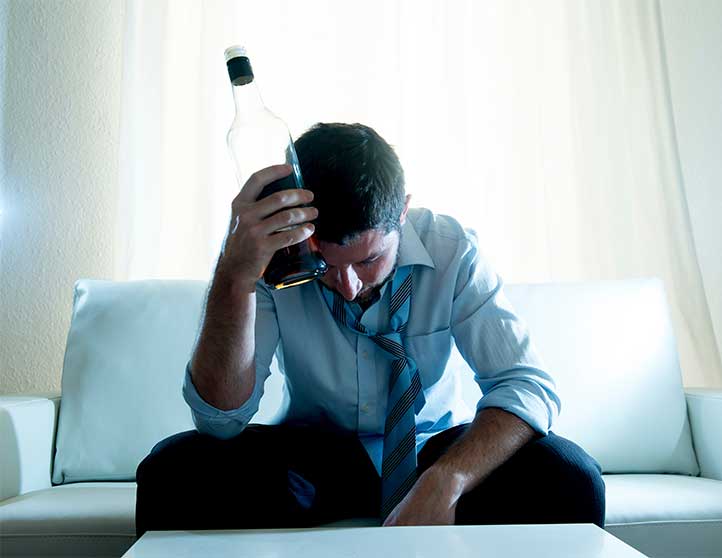Alcohol Addiction & Depression | Symptoms & Treatment

Medically Reviewed By: Manish Mishra, MBBS
Co-occurring alcohol addiction and depression can cause worsening health, alcohol withdrawal symptoms, a loss of energy, and suicidal thoughts. Dual diagnosis treatment centers can effectively identify and treat co-occurring disorders.

Alcohol addiction and major depressive disorder has a high comorbidity, or chance of happening at the same time.
Symptoms of co-occurring alcohol addiction and depression may include drinking alcohol to self-medicate depression, feelings of sadness, and an inability to stop drinking.
A 2019 report found that 33 percent of people receiving alcohol addiction treatment also suffered from depression. About 40 percent of people who suffer from depression may struggle with alcohol addiction in their lifetime.
From 2011 to 2020, about 22 percent of Ohio residents suffered from symptoms of depression. However, less than 20 percent received appropriate mental health treatment through 2020.
If you or a loved one are struggling with substance abuse, mental health disorders, or both, professional care at Ohio Recovery Center can help.
Signs & Symptoms Of Alcohol Addiction
Alcohol addiction, also known as alcohol use disorder or AUD, is defined by a need to drink alcohol so you can function normally. Even if your health is worsening due to drinking, you may be unable to stop drinking alcohol.
Signs of alcohol use disorder may include:
- feeling side effects of alcohol misuse, such as alcohol poisoning, cravings, or depressed mood when you’re not drinking
- needing alcohol for your body to function (alcohol dependence)
- drinking large amounts of alcohol despite worsening health
- problems at school or work due to alcohol consumption
- drinking 4 or more alcoholic beverages in one sitting (binge drinking)
- drinking 8 or more alcoholic beverages per week (heavy drinking)
Some of these symptoms, such as depressed mood or worsening health, may overlap with symptoms of depression.
Signs & Symptoms Of Depression
Major depressive disorder, also known as depression, is one of the most common mental health disorders in the United States. Stress, changes in your brain chemistry, genetics, and other factors can cause depression.
Depression affects your physical and mental health, causing symptoms such as:
- loss of interest in activities, relationships, or hobbies
- trouble concentrating
- loss of energy
- feelings of sadness or apathy
- excessive sleeping or trouble sleeping
- having suicidal thoughts
You can also see these signs in family members or loved ones.
Signs & Symptoms Of Co-Occurring Alcohol Addiction & Depression
A 2019 study reported patients going through alcohol use disorder treatment were almost 4 times as likely to develop depression as those without AUD.
Co-occurring alcohol addiction and depression can lead to a cycle of worsening mental health. The symptoms of depression can worsen an alcohol addiction, and vice versa.
Self-medicating by drinking alcohol is a short-term method of coping with depressive symptoms. However, the negative health effects of alcohol use can worsen your mental health over time, not improve it.
Risk Factors For Co-Occurring Mental Disorders
Other risk factors for co-occurring mental health conditions may include:
- stress or trauma in your life
- a family history of substance abuse
- a family history of psychiatric disorders
If you enter a dual diagnosis treatment program, your Ohio treatment provider may ask questions about your medical and family history.
Dual Diagnosis Treatment For Alcohol Use Disorder & Depression
Effective treatment options exist for alcohol use disorder and clinical depression individually. Treating co-occurring alcohol addiction and depression involve treatment options from both fields.
Psychotherapy
Psychotherapy is an evidence-based form of counseling used in both alcohol abuse treatment and mental health treatment. During psychotherapy, your therapist can help you understand and adjust your way of thinking to improve your mental health.
Effective forms of psychotherapy for dual diagnosis treatment may include cognitive behavioral therapy, motivational interviewing, and dialectical behavioral therapy.
Medication
Antidepressant medication can treat the symptoms of depression by increasing neurotransmitters in your brain.
Types of antidepressants include selective serotonin reuptake inhibitors (SSRIs) and tricyclic antidepressants. Antidepressants can work alongside therapy and other treatment options to manage depression.
Certain types of medication can also manage alcohol withdrawal symptoms such as cravings, insomnia, headaches, and mood swings. Alcohol treatment programs can prescribe acamprosate, naltrexone, and other approved medications to help you stop drinking.
A dual diagnosis treatment center can prescribe or manage medication for depression, alcohol withdrawal, or both conditions, depending on your specific needs.
Other Treatment Options
Other treatment options for co-occurring alcohol addiction and depression may include:
- alcohol detox programs
- long-term or aftercare services
- attending Alcoholics Anonymous or other support group meetings
- housing services
You can reach out to local treatment centers, such as Ohio Recovery Center, to learn more about dual diagnosis treatment options available to you.
Find Treatment In Ohio
Co-occurring disorders can hurt your well-being, physical health, and ability to function in daily life. If you or a loved one are struggling with co-occurring substance use disorders and mental health problems, professional mental health and addiction specialists at our facility can help.
Contact Ohio Recovery Center today for effective, evidence-based dual diagnosis treatment options. We can work with you or your loved one to find a treatment program that fits your specific needs.
- Alcohol Research https://www.ncbi.nlm.nih.gov/pmc/articles/PMC6799954/
- National Alliance on Mental Illness https://www.nami.org/Blogs/NAMI-Blog/October-2017/Understanding-Dual-Diagnosis
- National Institute on Alcohol Abuse and Alcoholism https://www.niaaa.nih.gov/health-professionals-communities/core-resource-on-alcohol/mental-health-issues-alcohol-use-disorder-and-common-co-occurring-conditions
- WKYC Studios https://www.wkyc.com/article/news/health/mental-health/depression-ohio-higher-than-nation-poor-mental-health-increasing/95-e03fcd95-dcac-4ed6-8fa8-1491cc128eed

